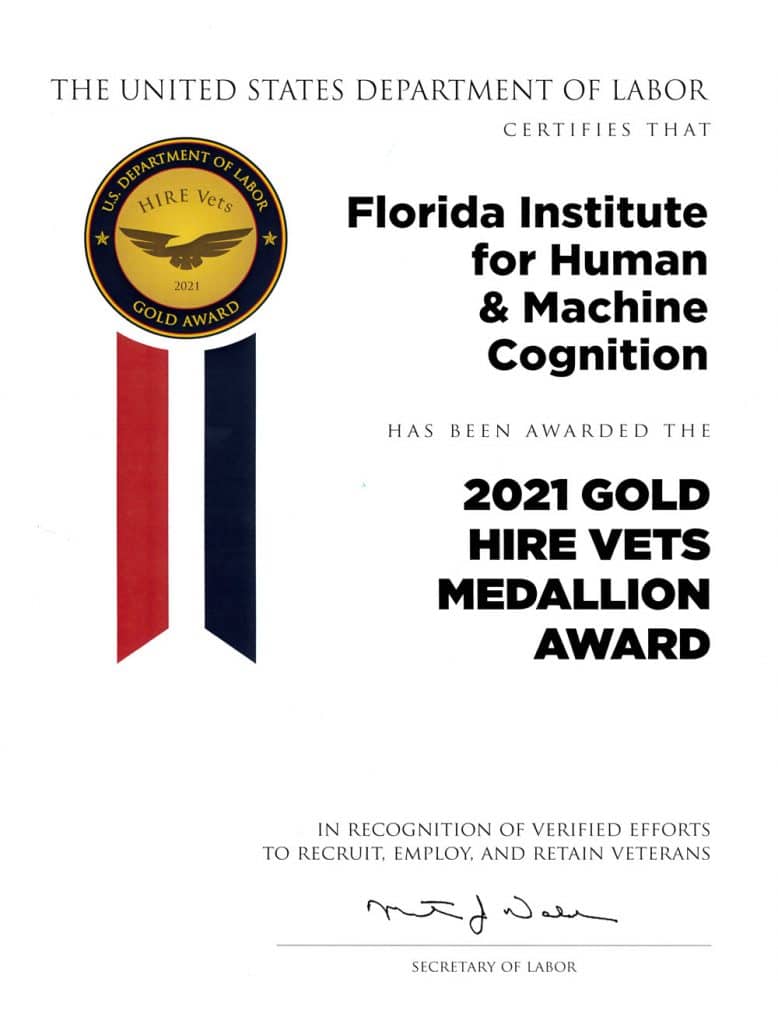Science Saturdays Return
Science Saturday is back in business for 2022.

IHMC’s popular STEM outreach program hosted four sessions in the fall of 2021 for grade-schoolers in both Ocala and Pensacola. The free, monthly event featured increased safety measures in response to the pandemic and still brought students a lineup of hands-on projects geared toward sparking the love of science for students in grade 3-6.
The educational series is moving forward in 2022, says Ursula Schwuttke, director of educational outreach for IHMC, continuing its longstanding tenure as a community fixture that sees IHMC and community scientists lead half-day sessions that use “fun science” to spark learning, Schwuttke says.
“Fun science gives kids the ability to discover their interest and ability in science, and to develop self-confidence,” she says. “Opportunity is vitally important for kids. Without the opportunity to discover their interest, they can’t know that it’s something they should pursue.”
In fall of 2021, Science Saturday hosted sessions on computer game design, robotics, neural networks and machine learning, and the physics of roller coasters. Roughly 35-40 students attended each of these sessions. The Science Saturday lineup for 2022 includes sessions on game design, robotics, circuits, monarch butterflies and more.
Parents find Science Saturday provides much-needed science enrichment.
“The fact that this is the only enrichment Science opportunity in Ocala that is free and open to all of Marion County Public School students is extraordinary and greatly appreciated!” says the parent of a fourth-grade boy who attended in Ocala.
“My first child counts science and math as her favorite subjects. My second has a wonderful science curiosity and is open to all kinds of lessons, so I appreciate a wide diversity in your programming,” says a Pensacola parent. “Thanks for a consistently high quality experience in our children’s community.”
The adults at the head of the classes enjoy it, too, including Heath Parr, technology education teacher at Brown-Barge Middle School in Pensacola.
“I enjoy teaching Science Saturday’s because the hands-on activities allow the students to truly engage with the lessons,” Parr says. “The students are allowed to move, discuss, and interact with each other. These learning environments are important to independent inquiry and leads to deeper understanding and knowledge retention.”
For 2022, safety guidelines around masks, limiting occupancy, and distancing will be in place to help everyone stay safe while they learn. Enrollment will be capped at 24 students per session.
Sign-up for each session opens two weeks before the date of each Saturday. To register your child, email PensacolaScienceSat@ihmc.us or call 850-202-4462.
Visit www.ihmc.us/outreach/science_saturdays and join the mailing list to stay up to date.
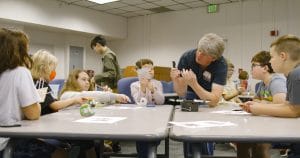

UWF and IHMC’s Intelligent Systems and Robotics program celebrate first Ph.D. graduate
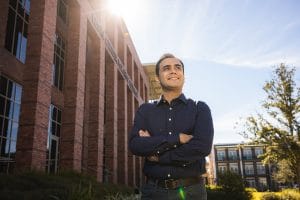
Taher Rahgooy, a Ph.D. candidate of the intelligent systems and robotics program launched by the Institute for Human and Machine Cognition and University of West Florida, became the program’s first graduate at UWF’s Fall Commencement in December 2021.
Rahgooy was among the initial cohort of five students to join the program when it was established two years ago and was one of two students who transferred to UWF from Tulane University on the heels of Dr. Brent Venable, the program’s founding director. Venable previously held a joint appointment as a professor of computer science at Tulane and research scientist at IHMC.
“The graduation of our first doctoral student is an incredible milestone for the intelligent systems and robotics program,” Venable said. “Only two years after its establishment, our program is contributing to the highly skilled workforce in the intelligent systems field, which is a national priority with a high demand market. His graduation validates and motivates all of our students, as well as UWF and IHMC mentors, to continue pursuing our innovative and personalized approach to graduate education in intelligent systems and robotics.”
Rahgooy was a second year doctoral student at Tulane University when Venable accepted the director role at UWF. He said it wasn’t initially an easy decision to transfer, but three key factors played a role in convincing him to make the jump.
“I really enjoyed working with Dr. Venable, as she is an extraordinary researcher and advisor and I knew that continuing to work with her would keep me on track for my future career,” Rahgooy said. “She told me about the IHMC community, which gives intelligent systems and robotics students access to world-class researchers. Finally, I knew the program would provide facilities for doctoral students that are essential for performing many machine learning and artificial intelligence tasks requiring the handling of big data.”
The program centers on developing leading-edge software and hardware technology that combines human and machine elements to exploit their respective strengths and mitigate their respective weaknesses. The first of its kind in Florida and one of only a few in the nation, the program serves the manufacturing, health care, defense and other high-tech industries, providing critical support to high-demand career fields.
The doctorate in intelligent systems and robotics program provides students with individualized paths tailored to their interests. The program includes foundational courses in robotics and artificial intelligence that address topics such as knowledge representation and reasoning, machine learning, computational methods in AI, basic hardware/software interaction and research methods.
“Through the program, I worked with great researchers who helped me understand the whole research environment better, and who gave help and guidance about the choices I should make for my future,” Rahgooy said. “The financial support of the program allowed me to fully focus on research without any distractions, and I was always supported and encouraged by the department to participate in prestigious conferences both for presenting my work and as an attendee. This accelerated my progress, which resulted in several publications and presentations.
“I feel really proud of what I’ve achieved and the kind of resume I was able to build in this program.”
Established in 2019, the program has grown to include 17 students from seven countries and 20 supervisors from IHMC and UWF’s departments of intelligent systems and robotics, computer science and earth and environmental sciences. Venable said the “cutting-edge” research portfolio of investigated topics includes human-machine teaming, vision, robotics, natural language processing, cybersecurity, machine learning, cognitive systems, multi-agent systems and marine environmental sensing.
“Our program allows the ‘mentor-student team’ to tailor the coursework and research portfolio to specific interests pursued by each team, following the European style for doctorates and freeing them from the academic constraints typically involved in the vast majority of AI and robotics graduate programs in the United States,” Venable said. “This level of personalization facilitates collaboration with industry and a project-driven style of research.”
Rahgooy earned a bachelor’s degree in computer engineering and a master’s in artificial intelligence before beginning his doctoral studies in computer science at Tulane University.
His dissertation, titled “Machine Learning Guided by Linguistic and Behavioral Knowledge,” discusses the data-driven methods he’s developed for learning various cognitive models of decision-making, along with his work to expand into problems with sequential settings such as reinforcement learning.
Rahgooy said the next step in his career is finding research positions in the intelligent systems and robotics industry to continue his efforts.
“Working with Taher has been a true pleasure,” Venable said. “He is the ideal doctoral student, one to whom you throw an idea and he comes back with a paper. He features a rare combination of a theoretical clarity of thought and very strong algorithmic and coding skills. He has grown into a mature and independent expert in intelligent systems and I am looking forward to hearing about his future successes.”
IHMC receives Medallion Award for hiring and recruiting military veterans
The U.S. Department of Labor announced on Wednesday that the Florida Institute for Human and Machine Cognition has received a 2021 HIRE Vets Medallion Award for the research center’s commitment to employing veterans.
The Medallion Award is the only federal-level veterans’ employment award that recognizes a company or organization’s commitment to recruiting, hiring, and retaining veterans. IHMC joins 848 other companies and organizations across the country who also were recognized for hiring veterans and providing them with career opportunities that take advantage of the diverse skills they acquired during military service.
“I’m a Navy veteran and so many of the other people who were part of IHMC’s beginning are also veterans,” said IHMC founder and CEO Ken Ford.
Between its Pensacola and Ocala branches, nearly 13% of IHMC’s new hires last year were veterans. IHMC’s Associate General Counsel Stephanie Tillery coordinated IHMC’s submission for the HIRE Vets Medallion Award.
“To be considered for the award, an entity must meet a seven percent hiring requirement, and we greatly exceeded that high standard,” she said. “We submitted our hiring and retention percentages and demonstrated that IHMC values our veterans and provides ample support and resources.”
IHMC is a not-for-profit research institute of the Florida University System where researchers pioneer science and technology aimed at leveraging and extending human capabilities. IHMC researchers and staff collaborate extensively with the government, industry and academia to help develop breakthrough technologies. IHMC research partners have included: DARPA, the National Science Foundation, NASA, Army, Navy, Air Force, National Institutes of Health, IBM, Microsoft, Honda, Boeing, Lockheed, and many others.
Senior Research Sports Scientist Joins IHMC
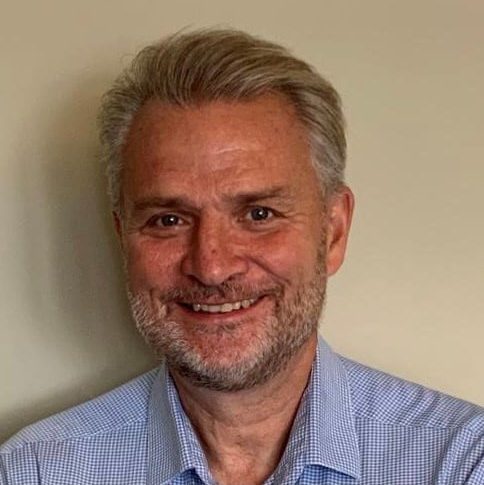 Dr. Mark Williams, the former Chair of the Department of Health and Kinesiology at the University of Utah and the Editor-in-Chief of the Journal of Sports Sciences, has joined the Florida Institute for Human and Machine Cognition as a Senior Research Scientist.
Dr. Mark Williams, the former Chair of the Department of Health and Kinesiology at the University of Utah and the Editor-in-Chief of the Journal of Sports Sciences, has joined the Florida Institute for Human and Machine Cognition as a Senior Research Scientist.
A native of North Wales, Williams previously held senior leadership positions at Brunel University in London and the University of Sydney in Australia before moving to the United States in 2016. He has published more than 250 articles in peer-reviewed journals in fields ranging from exercise and sports science to experimental psychology to neuroscience.
Williams’ research focuses on the neural and psychological mechanisms that underpin the acquisition and development of cognitive and perceptual-motor skills. In addition to his role at the Journal of Sports Sciences, he also is the editor of the Research Quarterly for Exercise and Sport and the journal Human Movement Science. He is a Fellow of the British Psychological Society, National Academy of Kinesiology, British Association of Sport and Exercise Science and the European College of Sports Sciences.
“Mark has a great international reputation and we’re very fortunate to have him become part of our team,” said IHMC’s founder and CEO Dr. Ken Ford. “As we expand our research with the addition of the new Center for Human Healthspan, Resilience and Performance, Mark will play an instrumental role in helping us establish this facility as a one-of-a-kind research center.”
International leader in human performance accepts leadership role at IHMC
 IHMCs Director and CEO Dr. Ken Ford announced that Dr. Morley O. Stone, the former senior vice president for research at the Ohio State University is joining the institute as Chief Strategic Partnership Officer.
IHMCs Director and CEO Dr. Ken Ford announced that Dr. Morley O. Stone, the former senior vice president for research at the Ohio State University is joining the institute as Chief Strategic Partnership Officer.
Dr. Stone is recognized as an international leader in human performance and biomimetics with nearly 30 years of experience in research and development. At IHMC, he will assume a leadership role in developing external strategic relationships with federal agencies, research universities and the private sector as well as implementing, coordinating and initiating scientific projects and assisting and mentoring IHMC scientists and research staff.
As senior vice president for research, Dr. Stone oversaw an annual budget of over $1billion in basic and applied research while at Ohio State. Prior to OSU, Morley served as the Chief Technology Officer for the Air Force Research Laboratory where he was responsible for assisting with the planning and execution of an annual $2.1 billion Air Force science and technology program and an additional $2.3 billion in externally funded research and development. From 2003 to 2006, Dr. Stone accepted an assignment as Program Manager in the Defense Sciences Office at the Defense Advanced Research Projects Agency (DARPA).
Dr. Stone earned his PhD in biochemistry from Carnegie Mellon University and his research interests are broad spanning areas such as the interface of materials science, biotechnology, human performance, and autonomous systems. In addition to his research leadership, Dr. Stone is a recognized leader in government and higher education in addressing and preventing foreign influence in research and development.
IHMC is a not-for-profit research institute of the Florida University System where researchers pioneer science and technology aimed at leveraging and extending human capabilities.
IHMC’s Bonnie Dorr recognized for her distinguished career
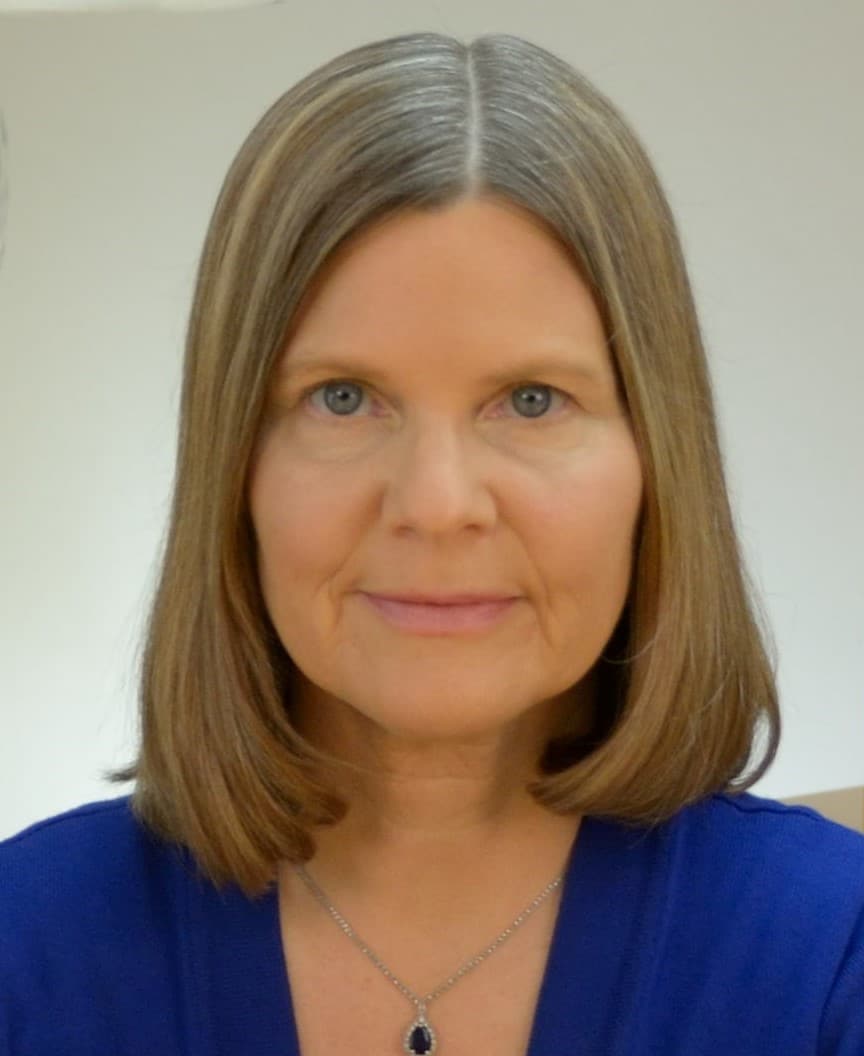 Dr. Bonnie Dorr of The Florida Institute for Human and Machine Cognition has been named a fellow of the Association of Computing Machinery. She is one of 95 fellows ACM is honoring this year for their contributions in computing and information technologies.
Dr. Bonnie Dorr of The Florida Institute for Human and Machine Cognition has been named a fellow of the Association of Computing Machinery. She is one of 95 fellows ACM is honoring this year for their contributions in computing and information technologies.
Dorr is the associate director of IHMC’s Ocala branch and one of the institute’s senior researchers. She is recognized as one of the nation’s leaders in the field of natural-language processing.
“This is a great honor for Bonnie,” said IHMC CEO Ken Ford. “She has had such a distinguished career. Her expertise extends from cyber security to social computing to artificial intelligence. It is great to see her recognized for the important work she does.”
ACM has members from around the world who work in AI, cloud computing, computational biology, data science, software engineering, human-computer interaction, virtual reality and other areas. The ACM Fellows program recognizes the top one percent of the association’s worldwide membership.
“These men and women have made pivotal contributions to technologies that are transforming whole industries as well as our personal lives,” said ACM President Gabriele Kotsis. “We fully expect these new ACM Fellows will continue in the vanguard of their respective fields.”
Together with her colleagues at IHMC, Dorr has established the new field of Cyber-Natural Language Processing, which brings together expertise at the
intersection of cyber security, social computing, AI, and natural language processing. Her interests focus on cyber-event extraction and natural language understanding for detecting attacks, discerning intentions of attackers, and thwarting social engineering attacks.
Last year, the Defense Advanced Research Projects Agency (DARPA) invited Dorr and a handful of other scientists and engineers from across the country to become part of a group that provides independent assessments of advanced information science and technology as it relates to the U.S. Department of Defense.
Since joining IHMC in 2014, Dorr has led several DARPA projects, including the design of a system to detect and thwart social engineering attacks on the U.S. She also is working on an IARPA project for AI-inspired extraction of multiple viewpoints from language inputs.
IHMC’s James Allen honored as one of nation’s top scientists
 IHMC Associate Director and Senior Research Scientist James Allen has been elected to the rank of AAAS Fellow by the American Association for the Advancement of Science.
IHMC Associate Director and Senior Research Scientist James Allen has been elected to the rank of AAAS Fellow by the American Association for the Advancement of Science.
Each year the association elects members whose efforts to advance science and its applications are considered distinguished and scientifically valid. AAAS specifically cited Allen for his “broad contributions to artificial intelligence and natural-language understanding, including seminal contributions in temporal logic.”
In addition to his work at IHMC, which he joined in 2006, Allen also has an appointment as the John H. Dessauer Professor of Computer Science at the University of Rochester in Rochester, N.Y.
Since earning his Ph.D. in computer science in 1979 from the University of Toronto and receiving the Presidential Young Investigator award from the National Science Foundation in 1984, Allen has built an international reputation as a leader in AI and collaborative human-machine interaction.
“This is such a well-deserved honor for James,” said IHMC Chief Executive Officer Ken Ford. “Throughout his career, James has been an AI thought leader. I, as well as the rest of James’ colleagues here at IHMC, are extremely happy for him.”
The designation of AAAS Fellows began in 1874. James’ official election as a Fellow will be honored at the association’s annual meeting, which this year, because of COVID-19, will be held virtually in February.
IHMC is a not-for-profit research institute of the Florida University System where researchers pioneer technologies aimed at leveraging and extending human capabilities. For more information, visit ihmc.us.
Distinguished Exercise Scientist Joins IHMC
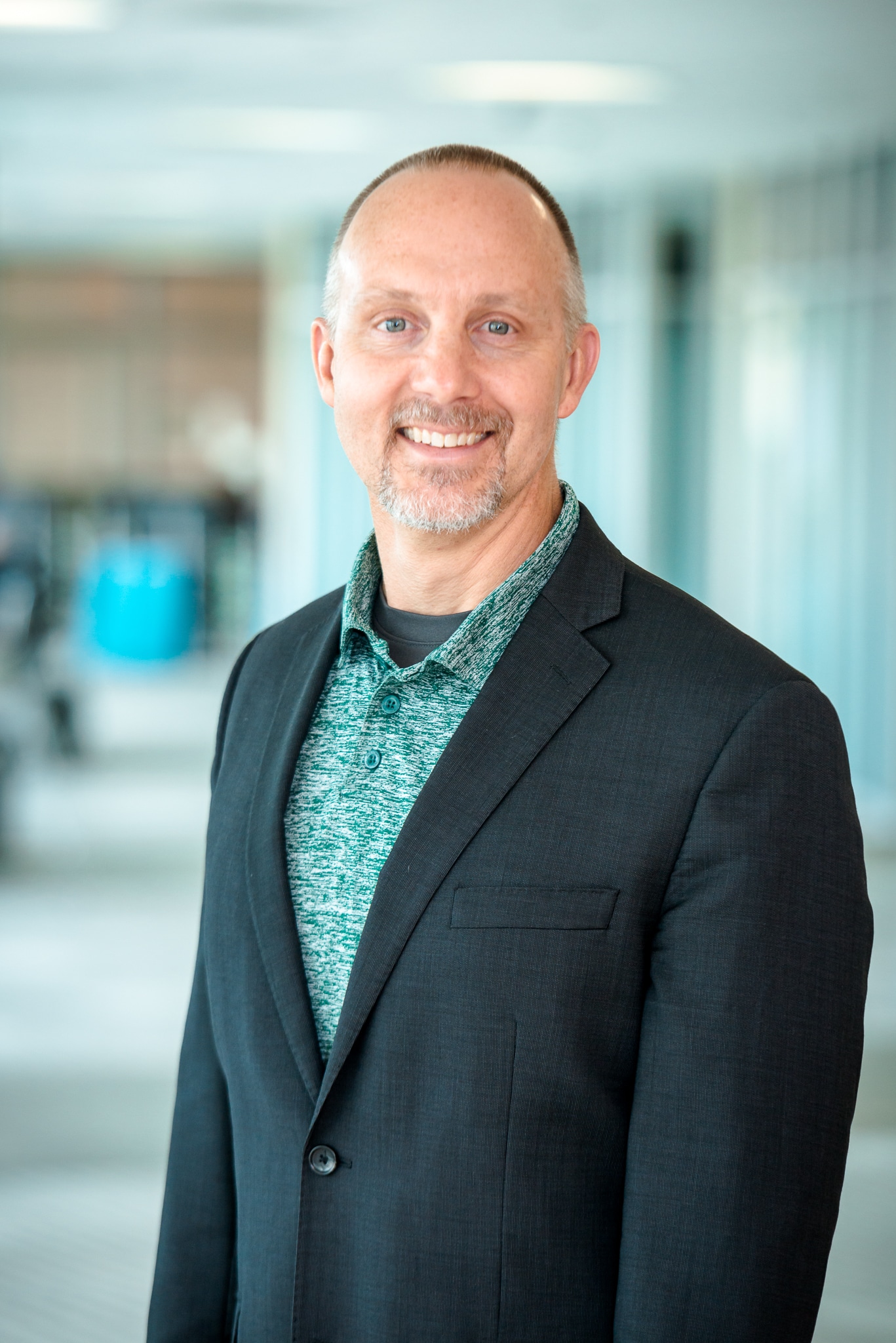 Dr. Marcas Bamman is an internationally recognized researcher known for his scientific contributions to the biology of human skeletal muscle and medical rehabilitation. He is the founder and former director of the University of Alabama at Birmingham Center for Exercise Medicine.
Dr. Marcas Bamman is an internationally recognized researcher known for his scientific contributions to the biology of human skeletal muscle and medical rehabilitation. He is the founder and former director of the University of Alabama at Birmingham Center for Exercise Medicine.
Bamman and the UAB center are recognized as world leaders in the biological mechanisms underlying exercise-induced adaptations and their clinical utility in disease prevention, treatment and rehabilitation. He joins IHMC as a Senior Research Scientist and will become part of a biologically-motivated team that IHMC founder and CEO Ken Ford has been forming for the past several years.
Since its founding in 1990, IHMC has primarily conducted advanced research in the fields of artificial intelligence and robotics. The past few years, however, Ford has been building a research team focused on health span, resilience and performance. IHMC is particularly focused on innovative ways to extend the capabilities and resilience of high-performing humans such as astronauts, fighter pilots, and elite special operators.
“Marcas has become known worldwide for his work in understanding the molecular responses to exercise and how they relate to health and performance,” said Ford. “His research is highly valued by such organizations as the National Institutes of Health, the Department of Defense, NASA and other agencies around the nation. He will be a wonderful colleague.”
Bamman is often featured in national media on how exercise-induced health benefits can impact disease prevention, treatment, and rehabilitation. A 2011 clinical trial of his attracted considerable national attention for showing how men and women in their 60s and 70s who began supervised weight training could develop muscles that were as large and strong as those of the average 35-40-year-old.
“In the later stages of my academic career, I became more and more interested in defense-related research and ways to maximize the performance and resilience of warfighters and special forces,” said Bamman. “IHMC is obviously one of the nation’s top leading-edge research institutes that I came to know quite well after giving a talk there.”
That talk led to a couple of collaborations with the institute and IHMC’s Chief Science Officer Tim Broderick.
“I really appreciate the leadership, vision and mode of operations at IHMC, all of which are centered on research impact,” said Bamman. “The research at the institute is highly innovative and will translate to important consequences and scientific advances. IHMC’s current human performance and resilience research is certainly strong but is just the tip of the iceberg with an exciting future ahead.”
One of the first projects Bamman will work on at IHMC is a DARPA-sponsored program aimed at developing a revolutionary platform to enhance training and resilience of elite service members. Called the Peerless Operator Biologic Aptitude project, it is being developed to increase the biologic aptitude of warfighters in an effort to increase their adaptability and resilience.
IHMC is a not-for-profit research institute of the Florida University System where researchers pioneer technologies aimed at leveraging and extending human capabilities. For more information, visit ihmc.us.
DARPA taps IHMC’s Bonnie Dorr for group to assess agency’s research
 The Defense Advanced Research Projects Agency (DARPA) has named Dr. Bonnie Dorr of IHMC to its Information Science and Technology (ISAT) Study Group for a three-year term.
The Defense Advanced Research Projects Agency (DARPA) has named Dr. Bonnie Dorr of IHMC to its Information Science and Technology (ISAT) Study Group for a three-year term.
Dorr is a leading researcher in the field of natural language processing. She serves as an associate director and senior research scientist at IHMC’s Ocala branch. The ISAT Study Group brings together 30 scientists and engineers from across the country who provide continuing and independent assessments of advanced information science and technology as it relates to the U.S. Department of Defense.
DARPA is an agency of the United States Department of Defense responsible for the development of emerging technologies for use by the military. President Dwight D. Eisenhower created the agency in 1958 in response to the Soviet launching of Sputnik in 1957. The agency created the ISAT Study Group in 1987 to support its technology offices and identify future research directions.
“I am truly honored to be part of such a bright and talented group,” said Dorr. “To be able to have a hand in shaping future research for an agency like DARPA is a once-in-a-lifetime opportunity. I’m really looking forward to this.”
Dorr has worked with DARPA on a number of projects since joining IHMC in 2014. She has led the design of a system to detect and thwart social engineering attacks on the U.S. and also is working with a group developing AI-inspired communication.
“Bonnie is one of the top researchers in her field and an excellent choice to serve on the ISAT Study Group,” said IHMC CEO Ken Ford. “I think it’s a real testament to Bonnie that she is one of the few women to have been named to the ISAT Study Group. I hope her leadership and success as a scientist encourages other women to consider computer science and natural language processing as a career.”
Together with colleagues at IHMC, Dorr has established the new field of Cyber-Natural Language Processing, bringing together expertise at the intersection of cyber, social computing, AI, and natural language processing. Her interests focus on cyber-event extraction and natural language understanding for detecting attacks, discerning intentions of attackers, and thwarting social engineering attacks.
IHMC podcast in the running for international award
The International Academy of Digital Arts and Sciences announced this week that STEM-Talk has been nominated for the Webby Awards, an international competition recognizing internet excellence.
STEM-Talk, an educational service of the Florida Institute for Human and Machine Cognition (IHMC), received nominations in the science and education podcast categories for the Webby Awards as well as the Webby People’s Voice Awards. Academy members select winners for the Webby Awards while the People’s Voice Awards are voted on by the public.
People have until May 7th to visit vote.webbyawards.com to cast their ballots.
As a Webby nominee, STEM-Talk has been singled out as one of the five best podcasts in the world in the science and education category. Last year, more than three million people from 230 countries cast ballots in the People’s Voice awards.
STEM-Talk won first place the past two out three years in the science and medicine category of the Annual People’s Choice Podcast Awards.
Ken Ford, IHMC’s co-founder and CEO, co-hosts the podcast with IHMC Research Scientist Dawn Kernagis. STEM-Talk, with more than 100 episodes, features conversations with some of the most interesting people in the world of science and has been downloaded by more than two million people since its launch in 2016. For more information on IHMC, visit www.ihmc.us.
STEM-Talk wins People’s Choice award for second time in three years
 For the second time in its three years in existence, IHMC’s podcast STEM-Talk has won first place in the science and medicine category at the 14th Annual People’s Choice Podcast Awards.
For the second time in its three years in existence, IHMC’s podcast STEM-Talk has won first place in the science and medicine category at the 14th Annual People’s Choice Podcast Awards.
The international competition features thousands of nominees in more than 20 categories. According to Todd Cochrane, who founded the competition in 2005, People’s Choice recognizes the top podcasts in the world as nominated by listeners.
“The awards are truly independent and the shows that are nominated and win have significant bragging rights as being listener favorites,” said Cochrane.
STEM-Talk is nearing its 100th episode and also closing in on 2 million downloads. In 2017, STEM-Talk not only took home the top prize in the science and medicine category, but also was runner-up for the competition’s grand prize.
STEM-Talk bills itself as “conversations with some of the most interesting people in the world of science and technology.” The guests have ranged from Nobel Prize winners in physics to NASA Astronauts to numerous thought leaders in the medical sciences.
The podcast uploads to iTunes, Stitcher, Google, Overcast and other podcast apps twice a month.
IHMC CEO Dr. Ken Ford co-hosts the podcast with IHMC Research Scientist Dr. Dawn Kernagis. Senior Creative and Multimedia Specialist William Howell edits the podcast along with staff member Jordan Accardo. Communications Director Randy Hammer is the show’s producer.
Some of STEM-Talk’s more popular episodes include:
- Dr. Stuart Phillips, professor of kinesiology at McMaster University, who in episode 82 talked about his research into muscle health and dietary protein.
- Dr. Robert Epstein, a psychologist, journalist and former editor of Psychology Today, who talked about his academic career in behavioral sciences in episode 89 and also his most recent research into the invisible influence that technology companies, particularly Google, have on consumer and political behavior.
- Megan Roberts, the scientific director at Nourish Balance Thrive, who was featured in episode 92 and is best known for her 2017 paper in Cell Metabolism that showed a ketogenic diet extended the longevity and health span of adult mice.
To find these episode and others, visit ihmc.us/stemtalk.
UWF and IHMC announce inaugural cohort for state’s first Ph.D. in Intelligent Systems and Robotics
UWF-IHMC Press Release 20191007.pdf
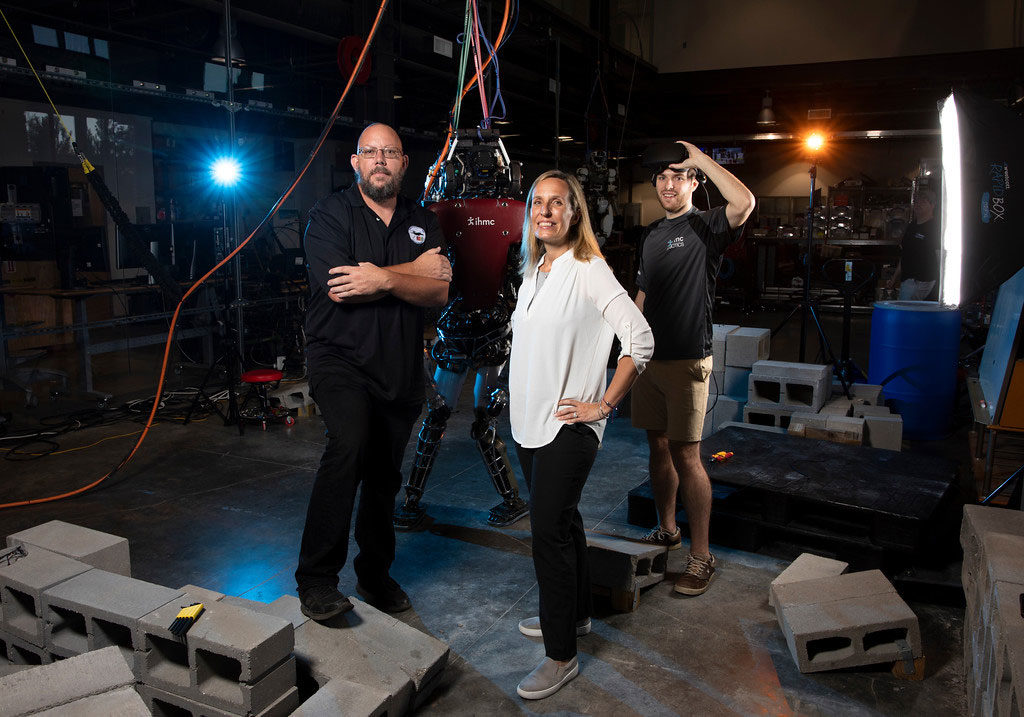 Doctoral program director Brent Venable, center, with Jacques Perry, left, and Duncan Calvert, right
Doctoral program director Brent Venable, center, with Jacques Perry, left, and Duncan Calvert, right
This fall, the University of West Florida and the Institute for Human and Machine Cognition welcomed the inaugural cohort of five students to the newly established intelligent systems and robotics doctoral program.
The program centers on developing leading-edge software and hardware technology that combines human and machine elements to exploit their respective strengths and mitigate their respective weaknesses. It aligns with the University’s strategic vision for research that impacts Northwest Florida’s economic development and technology enterprise. The first of its kind in Florida and one of only a few in the nation, the program will serve the manufacturing, health care, defense and other high-tech industries, providing critical support to high-demand career fields.
“UWF welcomes an esteemed group of eager doctoral students, each with a uniquely impressive background,” said UWF President Martha D. Saunders. “They are ready, and we are confident that UWF and IHMC will guide them to their individual success.”
The doctorate in intelligent systems and robotics program will provide students with individualized paths tailored to their interests. The program is comprised of foundational courses in robotics and artificial intelligence, or AI, that address topics such as knowledge representation and reasoning, machine learning, computational methods in AI, basic hardware/software interaction and research methods.
“Our mission for this program is to develop students into graduates who can step right into opportunities in the workforce that will be ready and waiting for them, to further the field and innovative research,” said Dr. Ken Ford, CEO of IHMC.
Two of the students, Taher Rahgooy and Andrea Martin, transferred to UWF from Tulane University to be part of the inaugural cohort on the heels of Dr. Brent Venable being named director of the intelligent systems and robotics doctoral program. Venable previously held a joint appointment as a professor of computer science at Tulane and research scientist for IHMC. She said her first priority in the program is setting the students up for success in research that interests them.
“The way I see it, my job is to make this an optimal environment and opportunity for all of the participants; the students, faculty, researchers involved,” Venable said. “These students will work in labs with researchers for more than four years and will have a chance to make a difference. From a mentor point of view, this is ‘academic parenting,’ and it’s my job to make sure it’s successful.”
Jacques Perry, a UWF alumnus and military veteran, is another candidate who was accepted into program. Perry has 10 years of cybersecurity experience and currently serves as the lead cybersecurity engineer and information system security manager for the 782nd Test Squadron at Eglin Air Force Base.
Perry completed an internship with IHMC during graduate school, which he said first sparked his interest in AI. When the opportunity arose to conduct AI research that could enhance cybersecurity efforts, along with access to IHMC resources, he didn’t hesitate to apply for the doctoral program.
“My doctoral work will be directly applicable to cybersecurity for Air Force missions,” Perry said. “This degree program will also allow me to gain a leadership position in the Air Force cyber community, where I’ll be able to bring more focus on the capabilities of AI in cyber defense and offense. I eventually expect to see AI playing both strong defensive and offensive roles in cyber warfare, which will inherently require the next generation of cybersecurity personnel to thoroughly understand the capabilities and limitations of AI and how it will shape the cyber battlefield.”
The other students included in the Fall 2019 class include UWF alumni Duncan Calvert, who currently works in the robotics lab at IHMC, and Bhavyansh Mishra, a recent UWF graduate who interned at IHMC in the summer of 2018.
A not-for-profit research institute of the State University System, IHMC is a pioneer of technologies aimed at extending human capabilities through a unique approach combining computer science, cognitive psychology, neuroscience, engineering, medical sciences and related disciplines.
For more information about the Ph.D. in Intelligent Systems and Robotics, visit uwf.edu/isr.
UWF and IHMC announce inaugural director for Intelligent Systems and Robotics doctoral program
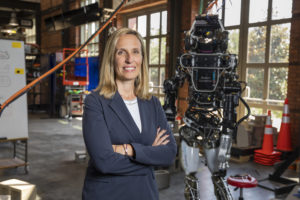 The University of West Florida and the Florida Institute for Human & Machine Cognition announce Dr. Kristen “Brent” Venable as the inaugural director of the Ph.D. in Intelligent Systems and Robotics program.
The University of West Florida and the Florida Institute for Human & Machine Cognition announce Dr. Kristen “Brent” Venable as the inaugural director of the Ph.D. in Intelligent Systems and Robotics program.
UWF is partnering with IHMC for the program, which begins in Fall 2019. Venable will shape and direct the new program, hire faculty and recruit doctoral students.
“The highly-anticipated doctoral program has found a well-suited leader in Dr. Venable,” said UWF President Martha D. Saunders. “Her expertise in artificial intelligence matches well with the program’s vision to develop thought-leaders in these exciting fields.”
Venable joins UWF from Tulane University, where she held a joint appointment as a professor of computer science and research scientist for IHMC.
“I have known Brent for a long time and she is the perfect choice to head up the new program,” said Dr. Ken Ford, IHMC CEO and director. “Brent has broad expertise in AI and related topics, and we are fortunate that she has agreed to take this position.”
Venable’s primary research interests are within artificial intelligence including constraint-based reasoning, preferences, temporal reasoning and computational social choice. Her research focuses on providing a solid framework for the design and deployment of intelligent systems able to reason about preferences.
“This is an exciting opportunity for me,” Venable said. “I love research and I love working with students, so this position gives me the best of both worlds. I’m particularly excited with the potential we have to develop a unique program in the United States that will have students working on research projects as soon as they set foot on campus.”
Venable began her career in higher education as a faculty member in the Department of Pure and Applied Mathematics at the University of Padova in Italy, where she also earned a doctorate in computer science and a Laurea degree with honors in mathematics.
The new program is the first of its kind in Florida and one of only a few in the nation. It aligns with the University’s strategic vision for research that impacts Northwest Florida’s economic development and technology enterprise. Manufacturing, health care, defense and other high-tech industries will be served by the program, providing critical support to high-demand career fields.
The program will focus on providing students an immersive hands-on research experience from the outset.
“Excitement surrounding the new program has been tangible, and with the announcement of Dr. Venable’s leadership, the excitement grows,” said Dr. Jaromy Kuhl, interim dean of the Hal Marcus College of Science and Engineering. “Her interests and expertise will be instrumental in launching and establishing a competitive program that prepares generations of students for lifelong success.”
For more information about the Doctorate in Intelligent Systems and Robotics program, visit uwf.edu/isr
IHMC and Andrews Research and Education Foundation announce partnership to conduct research projects
Pensacola’s cutting-edge research center The Florida Institute for Human & Machine Cognition (IHMC) and the Andrews Research & Education Foundation (AREF), the research arm of the Andrews Institute in Gulf Breeze, have signed an agreement to collaborate on human-performance research.
“We’re really fortunate to have two world leaders in human-performance right here in our community,” said Ken Ford, co-founder and CEO of IHMC. “This partnership is going to leverage the work of both organizations for the benefit of sports medicine as well as programs geared toward improving the capabilities and resilience of astronauts, fighter pilots, divers and other elite members of our military.”
IHMC and AREF will share office and lab space at their Pensacola and Gulf Breeze facilities. The scientists and doctors will collaborate on research into areas ranging from optimizing physical and cognitive performance to developing technologies aimed at helping high-performing humans like professional athletes, astronauts and fighter pilots.
“People here at AREF are thrilled they’ll be able to work with IHMC in areas that will help us with neurosurgery, neuroscience, ophthalmology and, of course, sports medicine,” said Ashton Hayward, president of Andrews Research & Education Foundation.
IHMC is a not-for-profit research institute that has grown into one of the world’s premier research organizations. Its scientists and engineers investigate a broad range of scientific and technological topics with the goal of amplifying and extending human cognition, perception, locomotion and resilience. In particular, IHMC has been a leader in AI, robotics, and human performance in extreme environments. The Pensacola-headquartered research institute is part of the Florida University System with a branch in Ocala.
AREF is the research arm of the Andrews Institute, the nation’s premier orthopaedics and sports medicine center. Andrews Institute is part of Baptist Health Care and was founded by Dr. James Andrews, an orthopaedic surgeon known for treating knee, elbow and shoulder injuries as well as repairing damaged ligaments. He has helped treat injuries and revive the careers of numerous high-profile athletes such as Drew Brees, Bo Jackson, Roger Clemens, Jerry Pate, Jack Nicklaus, Charles Barkley and Michael Jordan.
Hayward, who spent eight years as mayor of Pensacola before joining AREF in January, said the mission is to help educate the public and further research into the areas of orthopaedics, human performance, injury prevention, technology as well as surgical and biomedical enhancement.
“Most people are aware of the clinical work we do with athletes,” said Hayward. “But it’s not as well known that we also do a lot of work with active-duty members of the special- operations community. We provide them physical therapy, performance training and nutritional support.”
It was this work with the special-operations community that particularly drew the interest of IHMC Research Scientist Dawn Kernagis.
“As we have expanded our research into biological ways to extend the capabilities and resilience of high-performing humans in the military, especially those who have to operate in extreme conditions, a partnership with AREF made perfect sense,” said Dr. Kernagis, who leads a dozen members of IHMC’s bio-medical team.
Immediate plans include IHMC and AREF personnel working together on current ongoing research projects as well as developing proposals for future projects and grants.
For more information on AREF visit: https://www.andrewsref.org
Ryan Tilley Appointed to the FloridaWest Economic Development Alliance Board of Directors
 FloridaWest EDA is pleased to announce that Ryan Tilley of the Florida Institute for Human and Machine Cognition has been appointed to the FloridaWest Board of Directors by the Escambia County Commission. Tilley joins Karen Sindel as one of the two county appointees to serve the community on the economic development alliance board.
FloridaWest EDA is pleased to announce that Ryan Tilley of the Florida Institute for Human and Machine Cognition has been appointed to the FloridaWest Board of Directors by the Escambia County Commission. Tilley joins Karen Sindel as one of the two county appointees to serve the community on the economic development alliance board.
Ryan is currently the Director of Strategic Program Execution and Innovation at the Florida Institute for Human and Machine Cognition (IHMC) and is also a partner in two Pensacola based software engineering companies. Prior to joining IHMC, Ryan was the Chief Operating Officer for VetCV Inc., a software application company focused on supporting Veterans and their families.
Ryan was also the COO for KontactIntelligence Inc., a leading healthcare industry physician recruitment software platform.
Ryan earned his master’s in Business Administration as well as Bachelor of Science in both Finance and Global Economics from the University of West Florida. He also received his master’s certificate in Entrepreneurship from the University of West Florida. He is married to his lovely wife Kelly and together they have two amazing sons.
“With his experience with technology based companies, Ryan Tilley will be a key asset to our board,” said Scott Luth, FloridaWest. “With our current focus on building the Cyber Security assets in Escambia County, we are looking forward to working with Ryan to create jobs and establish new business.”
“I have a passion for the Northwest Florida region,” Ryan said, “and I am looking forward to driving successful, sustainable, and responsible economic development for our community.”
The most important, innovative company to open in Ocala in the past 20 years.
The February 2019 issue of Ocala Style has named IHMC as the most important, innovative company to open in Ocala in the past 20 years. You can read the article here, https://issuu.com/ocalastyle/docs/0219os_book/32
IHMC CEO named to National Security Commission on Artificial Intelligence
Pensacola-based Dr. Kenneth M. Ford, CEO and Co-Founder of the Florida Institute of Human & Machine Cognition (IHMC), has been named to join an elite group of industry leaders on the newly formed National Security Commission on Artificial Intelligence.
Created under the National Defense Authorization Act for 2019, the independent federal Commission is expected to review global advances, investments, and strategies in artificial intelligence (AI) and related technology systems, evaluate foreign developments and investments in AI, and recommend steps the United States might take to support its technological edge, while ensuring national security and competitiveness. Among its tasks, the Commission will consider military uses of AI, review “ethical considerations” that may result from advances in AI technologies, and evaluate opportunities to stimulate AI research and workforce development investments.
A recognized pioneer in machine cognition and AI systems, Dr. Ford’s participation on the Commission will bring particular insights into groundbreaking innovations in machine learning, cyber intelligence and security, robotics, sensory substitution, and data mining, while showcasing the thriving AI and defense-related industry activities taking place in Florida.
“America faces incredible challenges as technological advances upend our communities, disrupt our workplaces and threaten our national security,” said U.S. Senator Marco Rubio. “For nearly three decades, Dr. Ford has been at the forefront of understanding these changes and how they impact our nation and the world. His appointment to the National Security Commission on Artificial Intelligence is well deserved, and helps give me confidence our nation has the ability to adapt, thrive and prosper for generations to come.”
The 15-member Commission will be headed by former Google CEO and Chair Eric Schmidt and includes top executives from Oracle, Amazon and Microsoft, as well as senior representatives from the technology, intelligence, and defense sectors.
“I am quite honored to be part of this distinguished group, as we endeavor to consider the direction and impacts of AI technologies on national security and competitiveness” said Ford. “It has become critically important for us as a nation to understand the implications of AI and the importance of strategic investments in the same, and I am hopeful that this Commission will be able to identify the challenges and opportunities associated with this ever-evolving field.”
With $10 million in funding dedicated to its work, the Commission is charged with producing a report for the President and Congress with recommendations for “action by the Executive Branch and Congress related to artificial intelligence, machine learning, and associated technologies.” . The Commission’s findings and recommendations are fast tracked with an initial report due in 90 days, and annual reports to follow in August of 2019 and 2020.
Dr. Ford has served on a number of top national boards and commissions, including the Defense Science Board, National Science Board, and Air Force Science Advisory Board. He was on the Advanced Technology Board (ATB), which supports the Office of the Director of National Intelligence, and served as chair of the NASA Advisory Council. He was named by Florida Trend Magazine as one of Florida’s four most influential citizens in academia. Ford also was awarded NASA’s Distinguished Public Service Medal, which is the highest honor the agency confers. In 2018, he was inducted into the Florida Inventors Hall of Fame.
Co-Founded by Dr. Ford in 1990 at the University of West Florida, and incorporated as a not-for-profit research institute under the State University System in 2003 by the Florida Legislature, the IHMC is home to top scientists and engineers collaboratively engaged in cutting edge developments in the fields of artificial intelligence, robotics, human-machine interaction, cognitive psychology, computer science, and human performance. IHMC researchers are rethinking the relationship between humans and machines, and defining new directions in human-centered computing. IHMC collaborates extensively with industry, government, and university partners to develop sophisticated technologies that can be enabling with respect to society’s broader goals. Through its groundbreaking work with NASA, DoD, DARPA, and a range of private sector partners, IHMC has earned global recognition.
IHMC a finalist in Toyota Mobility Challenge
FIVE VISIONS FOR THE FUTURE OF MOBILITY, INCLUDING ONE FROM IHMC, UNVEILED AT CES
- Toyota Mobility Foundation, in partnership with Nesta’s Challenge Prize Centre, announces finalists in $4 million global Mobility Unlimited Challenge at CES in Las Vegas
- Innovators from around the world submitted game-changing technologies to improve the lives of people with lower limb paralysis
- Finalists include teams from United States, Japan, Italy and United Kingdom, with devices ranging from a hybrid exoskeleton on wheels to a powered wheelchair share scheme
- IHMC is one of five finalists to receive a $500,000 grant to develop their idea further. The final winner will be awarded $1 million in 2020 in Tokyo
Las Vegas, NV, USA (7 January 2019)- The five finalists in the three-year Mobility Unlimited Challenge have been unveiled at Consumer Electronics Show in Las Vegas. The Toyota Mobility Foundation launched the $4 million global challenge in 2017 in partnership with Nesta’s Challenge Prize Centre, with the aim of improving the lives of millions of people with lower-limb paralysis.
The Challenge invited engineers, innovators, and designers from across the world to submit designs for game-changing technologies, incorporating intelligent systems, to improve the mobility and independence of people with lower-limb paralysis. Central to the Challenge is the importance of collaboration with end-users to develop devices which will integrate seamlessly into users’ lives and environments, while being comfortable and easy to use, enabling greater independence and increased participation in daily life.
Each of the five finalists will receive a grant of $500,000 to develop their concept further, with the final winner of the Challenge receiving $1 million in Tokyo in 2020.
The five finalists are:
- The Evowalk: Evolution Devices (United States)-a smart wearable leg sleeve that helps people with partial lower limb paralysis regain their mobility. The EvoWalk AI system uses sensors to predict the user’s walking motion and stimulates the right muscles at the right time to help them walk better.
- Moby: Italdesign (Italy)– an integrated network of wheel-on powered devices, allowing users of manual wheelchairs the convenience and benefits of a powered chair, accessible via an app-based share scheme.
- Phoenix Ai Ultralight Wheelchair: Phoenix Instinct (United Kingdom) – an ultra-lightweight, self-balancing, intelligent wheelchair which eliminates painful vibrations.
- Qolo (Quality of Life with Locomotion): Team Qolo, University of Tsukuba (Japan)– a mobile exoskeleton on wheels, allowing users to sit or stand with ease.
- Quix: IHMC & MYOLYN (United States)– a robotic, powered exoskeleton with motors at the hips, knees and ankles, as well as additional actuators offering someone with lower-limb paralysis fast, stable, and agile upright mobility. Utilizing modular actuation, perception technology from autonomous vehicles, and control algorithms for balancing autonomous humanoid robots, this device will deliver the mobility, safety, and independence that current exoskeletons cannot. The device will improve accessibility in society – especially at home and work.
“We’re delighted to have made it through as one of the five finalists of the Mobility Unlimited Challenge,” said IHMC Senior Research Scientist Peter Neuhaus, who leads the IHMC and Myolyn team. “In the business world, developing technologies for people with lower-limb paralysis has been extraordinarily hard. We’ve constantly struggled against people saying the market is too small and because of that people aren’t putting in the effort, research or investment this field deserves, meaning there hasn’t been enough advancement.”
Myolyn is a medical technology company based in Gainesville, Fla., that is dedicated to improving health and human performance. IHMC is a not-for-profit research institute of the Florida University System that pioneers technologies aimed at leveraging and extending human capabilities.
Eighty entries were received from specialist teams in 28 countries globally.The finalists were chosen by a panel of expert judges from around the world.
Dr. Eric Krotkov, Chief Science Officer at Toyota Research Institute and one of the judges of the Challenge, stated: “There are so many technological opportunities to explore approaches to alleviate challenges stemming from lower-limb paralysis. A competition like the Mobility Unlimited Challenge gets innovators to focus on the same problem to identify something of great common interest that serves society. I am excited by these finalists who have a breadth of technical approaches – wheelchairs, orthotics, braces, exoskeletons. I look forward to seeing how they will take these devices out of their conceptual stage to help our end users.”
In addition to the $500,000 grant, the finalists will attend tailored workshops, receive mentoring opportunities with engineering experts, and collaborate with end users to further the development of their concepts through to 2020.
Around the world, millions of people are living with lower-limb paralysis (the most common causes being strokes, spinal cord injury and multiple sclerosis). While there are no statistics on paralysis worldwide, the World Health Organization estimates there are 250,000-500,000 new cases of spinal cord injury globally every year.
UWF partners with IHMC to develop first intelligent systems and robotics Ph.D. in Florida
The University of West Florida has partnered with the Institute for Human and Machine Cognition located in downtown Pensacola to develop a doctoral program in intelligent systems and robotics. The program will be the first of its kind in Florida and one of only a few in the nation.
“We are very excited about this new doctoral degree program,” said UWF President Martha D. Saunders. “The program brings together the strengths of UWF engineering and computer science programs with the expertise of a world-class research center, IHMC. It’s a game changer.”
The new doctoral program aligns with the University’s strategic vision for research that impacts Northwest Florida’s economic development and technology enterprise. It will serve the manufacturing, health care, defense and other high-tech industries, providing critical support to high-demand career fields.
“I’ve envisioned a program like this for a long time,” said Ken Ford, director and co-founder of IHMC. “It will attract top young talent from the world. This is such a great move not only for UWF and IHMC, but also for Pensacola and the state.”According to a 2012 study by the National Robotics Initiative, robotics technology holds the potential to transform the future of the U.S. and is expected to become as ubiquitous over the next decades as computer technology is today. The United States Bureau of Labor Statistics Occupational Outlook Handbook projects a 19 percent growth rate for computer and information technology research scientists over the next 10 years.
Drone program with City of Pensacola Police Department
Pensacola Mayor Ashton Hayward and IHMC are pleased to announce an innovative partnership between IHMC and the City of Pensacola Police Department in the development of a comprehensive police drone program.
The program will incorporate specialized drones in police operations such as search and rescue, disaster response, fugitive evasion, threat situations and monitoring outdoor events.
“This is a wonderful program that is going make Pensacola a safer community,” said Hayward. “And because we have the expertise of IHMC here in our community, we also are going to be in a leadership role in terms of the use of these specialized drones in fighting crime and in helping to make our community a safer place.”
While off-the-shelf drones are available to law-enforcement agencies, many are not appropriate for critical government services such as police operations. Most drones also are unable to handle missions that operate in or around buildings.
IHMC has been developing technology for years that is well-suited to provide customized drones that can be effective tools for law enforcement needs. IHMC and the Pensacola Police Department also will work together to develop a training program on the use of these specialized drones.
Pensacola-based IHMC is a not-for-profit research institute that has grown into one of the nation’s premier research organizations with world-class scientists and engineers investigating a broad range of topics related to building technological systems aimed at amplifying and extending human cognition, perception, locomotion and resilience. The institute is part of the Florida University System and has a branch in Ocala.“Most people know about our work with robots and NASA and the various branches of the military” said Ken Ford, IHMC CEO. “But this is a great example of how the expertise of our scientists is being used right here in Pensacola for the benefit of our community.”


